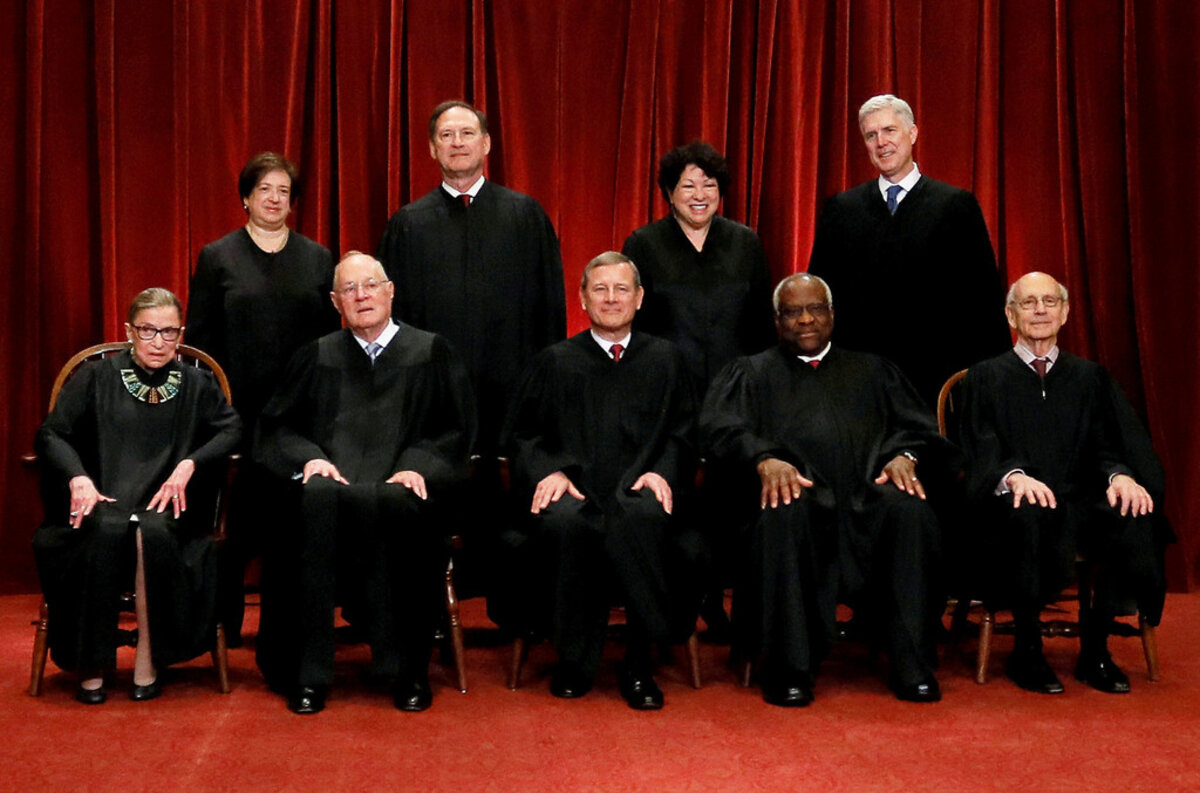Polls of Americans consistently show they put more trust in the Supreme Court than in the two elected branches of government (Congress and the presidency). Now a new poll may explain why the high court still enjoys legitimacy as the nation’s final arbiter of constitutional principles.
When asked what they would do if the court were to make many unpopular decisions, Americans show no consensus over how to change the court or even whether to change it. The poll, conducted for Penn State’s McCourtney Institute of Democracy, found 44 percent of people would favor imposing term limits on justices. Yet a third would do nothing with the court. A fifth would restrict the type of controversial cases that the court considers.
Perhaps most striking was that there seems little correlation between these different opinions and whether someone is a Republican, Democrat, or neither. The nation’s traditional political polarization seems to break down when it comes to judging those selected to judge for us.
This lack of consensus about how or whether to change the court’s independence is important because the nine justices keep being asked to issue rulings that would impinge on the authority of the legislative and executive branches – rulings that might prove unpopular. In the court’s coming term, for example, which starts in October, it will take up the issue of whether state lawmakers can alter the boundaries of voting districts that appear to favor one political party (partisan gerrymandering, as opposed to racial gerrymandering). In another case, the court will consider whether President Trump had the authority to impose a travel ban on people from seven predominantly Muslim countries.
Justices, like the rest of us, pay attention to the latest polls, especially if they show the courts losing popularity. At times, the courts might feel inclined to defer to public opinion or, as they increasingly do, defer to the authority of the other two branches. Yet by the very nature of their job, justices must rise above their personal preferences or political inclinations to decide a case. They must interpret the Constitution with humility and wisdom because its ideas define the principles for the whole country.
Political parties compete over the particular principles that each stands for, such as achieving equality at the expense of liberty, or putting social order above freedom of assembly and speech. Parties help organize public opinion into broad purposes, which are then presented in elections or contested in the courts. But any legal contest over each party’s specific principles stops when the high court applies the Constitution’s most basic principles to a case or tries to balance competing principles.
Public respect for this duty of the court is really a respect for the understanding that the highest ideals must guide and protect both individuals and their society. In a republic, only a few individuals are granted the authority – through a supreme court – to interpret the transcendent norms embedded in founding documents and case law. No wonder there is little consensus today about changing the high court if its decisions go against popular opinion.
A good example of this unique role is playing out in Kenya. On Sept. 1, that country’s high court voided the results of a presidential election because of unusual anomalies in the voting process and the refusal of the electoral commission to cooperate with the court. The court’s decision to order a new election sent shock waves across Africa, where most people only hope for an independent judiciary that applies universal ideals.
On Sept. 17, the United States celebrated the 230th anniversary of the adoption of the Constitution. Few Americans may have noticed. Perhaps they simply assume that its principles, and the court assigned to interpret them, are in working order.
 Clayton Collins
Clayton Collins










